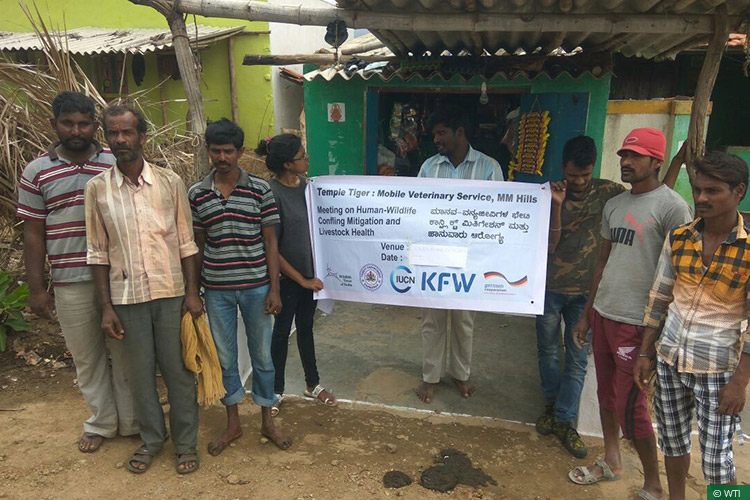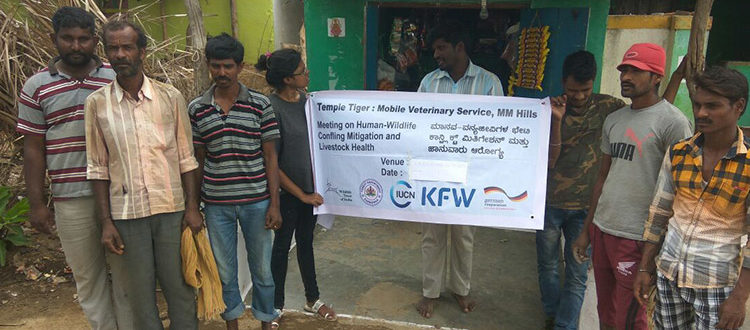Temple Tiger MVS Team Holds Consultative Meetings with Village Communities around MM Hills WLS
MM Hills Wildlife Sanctuary, Karnataka, July 5, 2017: The Mobile Veterinary Service (MVS) unit established by Wildlife Trust of India (WTI) under its Temple Tiger Project recently held a series of consultative meetings in the villages of Konankere, Yelchikere, Boradoddi, Basadoddi and Karamanthkari, which lie on the fringes of the MM Hills Wildlife Sanctuary.
While the primary aim of these meetings was to discuss issues related to human-wildlife conflict and livestock health, the villagers’ attitudes towards wildlife conservation and the forest department, and their expectations from WTI’s MVS unit were also sought to be determined.

Human-wildlife conflict: Crop and livestock depredation by wild animals was found to be the major cause of conflict in these villages. The villagers were unhappy with wild boars and elephants in particular, which raided crops on a daily basis during the cropping seasons. Leopard attacks on livestock were also a source of concern, though most of these had occurred because villagers left their animals to graze inside the forest unsupervised, despite the forest department’s warnings.
No attacks on humans were reported from any of the villages. However, an elephant was said to have attacked a cow in the village of Yelchikere!
Attitudes towards local agencies: The villagers largely expressed a sense of disappointment with the forest department. In cases of livestock depredation, they said, forest staff would reprimand them for sending their animals into the forest to graze. “We don’t get proper compensation for our crop losses either”, declared Putashetty of village Boradoddi.
In Konankere, villagers said that while the forest department provided them with firecrackers to drive away crop-raiding animals, these were too few and would usually get used up in a single incident.
Villagers also did not have a favourable view of the animal husbandry department. For instance, the villagers of Boradoddi said they preferred not to ask for veterinary aid because the doctors either did not do their job well or failed to respond altogether.
Villagers also complained that the local seed dispensaries were not doing a good job: the seeds were distributed to a few people in very large amounts, leaving the rest of the village at a terrible disadvantage.
For the moment, despite the livestock and crop losses they have suffered, the people of the five villages that the team visited remain tolerant towards wildlife.
Expectations and solutions: Villagers said that they wished to be provided with free seeds to cover crop losses caused by wild animals.
They regarded solar fences as temporary fixes to the problem of crop-raiding, but wanted the forest department to provide them with functioning solar fences all the same, until a better solution could be worked out. People in Boradoddi complained that the existing fences were not properly maintained.
The use of LPG stoves to reduce dependence on forest produce was also discussed. It was found that the distribution of these stoves had been uneven and many villagers had not received them.
For its part, the MVS team provided villagers with a helpline number to call in the event of an attack on their livestock. A few simple do’s and don’ts to help reduce conflict were also communicated. The villagers were also provided with medicines for their livestock with detailed instructions on dosage.
WTI’s Temple Tiger Project, of which the MVS unit is a part, was initiated in collaboration with the Nature Conservation Foundation. The project aims to address wildlife emergencies, mitigate human-wildlife conflict, and prevent disease spill-over from domestic to wild ungulates, which form the principle prey base for tigers and leopards in the MM Hills Wildlife Sanctuary.
The project’s scope includes the extensive surveying of villages in order to assess the nature of human-wildlife conflict in the larger landscape, as well as people’s general attitudes towards conservation activities. The consultative meetings held last month have given the project team a better understanding of the problems faced by villagers in the area, and will allow for the development of targeted solutions.
For the moment, despite the livestock and crop losses they have suffered, the people of the five villages that the team visited remain tolerant towards wildlife. No retaliatory killings of wild animals have been reported from these villages (though there have been leopard and tiger poisonings in nearby villages). If conflict is not addressed in a timely fashion, however, the patience that is now being displayed will inevitably wear thin.









